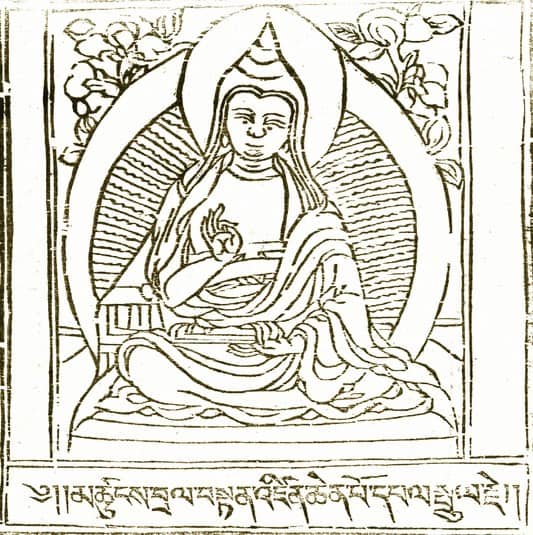Patrul Rinpoche was born in northern Kham, in 1808 into the Mukpo clan. He was recognized at an early age as the incarnation of the Pelge Lama, Samten Puntsok. Dodrupchen Jikmé Trinlé Özer gave him the name Orgyen Jigme Chökyi Wangpo. Throughout his life (and still in most references) he was more commonly known by the common title ‘Patrul’, an abbreviation of this incarnation, meaning the “Pelge Tulku”.
In his twenties, he left his incarnation’s residence at Pelge Samten Ling, choosing to spend the rest of his life as a wandering yogi and teacher. He studied under the master Jikmé Gyalwé Nyugu, a renowned student of Jikmé Lingpa, and received the teachings on the preliminary practices of the Longchen Nyingtik twenty-five times, completing twenty-five sets of the preliminary practice accumulations.
When Tertön Chokgyur Dechen Lingpa took the terma of Demchok Sangye Nyamjor from Rudam Kangtrö, the snow hermitage at Dzogchen, he appointed Patrul Rinpoche as the custodian of this and other cycles, including The Heart Essence of the Three Families (Riksum Nyingtik), and offered him all the necessary empowerments, reading transmissions and instructions. He was introduced to the nature of mind, rigpa, by means of a dramatic encounter with the tantric master Do Khyentse Yeshe Dorje, to whom he remained deeply devoted.
Patrul Rinpoche composed commentaries and structural outlines for core texts such as the treatises of Maitreya, The Way of the Bodhisattva, Treasury of Precious Qualities, and other texts. He was renowned for his itinerant teachings on The Way of the Bodhisattva and for his unusual advocacy for vegetarianism. Today he is most well-known for his widely read instruction text, The Words of My Perfect Teacher. He also authored a number of short collections of advice and miscellaneous writings. His popularity was due to his direct and colloquial style, and although his learning was vast, he was able to connect with people from all walks of life.
An example of his unusual style is The Drama in the Lotus Garden, a poignant poetic text using the metaphor of two honeybees written to console a young nobleman from Kham, Tashi Gelek, whose twenty-five-year-old bride had been killed in an epidemic. It is said that the young man, awakened to the truth by this metaphorical explanation, became a devoted disciple and achieved great realization.
This is for my son Śrī to keep in mind.
Three things must not be forgotten:
The gracious guru,
The compassionate Buddha,
And mindfulness and vigilance.Three things must be recalled:
The preceptor who transmitted the precepts,
The teachings that reveal those precepts,
And the commitments and vows to be upheld.Three things must be present:
The mind in the body,
The body on its seat,
And the mind in relaxation.Three things are best forgotten:
Hated enemies,
The objects of desire,
And dullifying sleep.Three things are best kept under control:
Your mouth when at gatherings,
Your hands when alone,
And your mind at all times.Three things must be kept secret:
From The Precious Treasury of Written Instruction Transmitted One-to-One by Patrul Rinpoche.
Your own virtues,
The faults of others,
And plans for the future.



